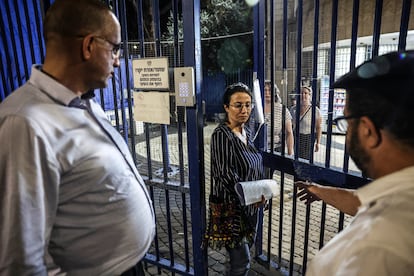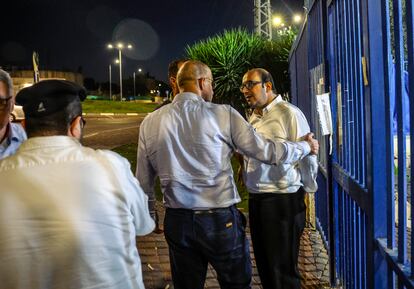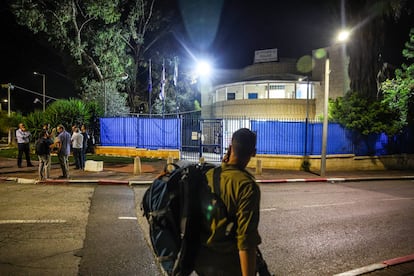Israel tightens its grip on the Arab minority
Police detained four former Palestinian MPs on their way to a protest in Nazareth. Persecution of displays of solidarity with Gaza grows after hundreds of interrogations, arbitrary dismissals and monitoring of social networks


On Thursday, as thousands of people in Tel Aviv called for Red Cross access to the hostages in Gaza, Hanin Zoabi — a former Arab member of the Israeli parliament — left the Migdal HaEmek police station in the Galilee, visibly distressed, after being in custody for more than seven hours. She belongs to the Arab minority: the nearly two million Palestinians with Israeli citizenship whom, since the Hamas attack on October 7, the state treats more than ever as a potential fifth column. Zoabi was the last of the four former parliamentarians arrested Thursday morning before they could begin a small silent protest in solidarity with Gaza in the city of Nazareth. They were released late in the afternoon, before their legal status had to be upgraded from interrogation to formal detention. The other three are under a 14-day restraining order from Nazareth, the country’s main Arab city. Because she lives in the city (she was, in fact, its mayor), Zoabi is forbidden only to set foot in the square that did not host the protest.
Zoabi, who has become number one enemy of the Jewish political majority for years for her involvement in the 2010 Freedom Flotilla (raided by Israeli commandos, who killed eight people), claims that the investigation itself lasted only 15 minutes. “Which shows that the target was the detainees themselves, that there was nothing to investigate. To silence, intimidate and show who owns the place,” she says. The former MP claims that the agents danced and sang war songs with the Israeli flag, and told her, “Maybe you don’t know where you live.” “The rules are different after October 7,” notes Zoabi, who links the silencing of her minority to the insecurity generated in the Jewish majority by the “collapse of the belief that the Palestinians are under their control.”
Half an hour earlier, Sami Abu Shehade left the police station. He leads Balad, the pan-Arabist party that lost its parliamentary presence in last November’s elections by running alone and falling three tenths of a percent short of the required 3.25% of the vote. He accuses Benjamin Netanyahu’s government of silencing “the slightest voice against the war” while “it is legitimate to be in favor of the extermination” of Gaza. He claims that the agents pushed him and insulted him in Nazareth; and directed his lawyer to one police station and then took him to another.

Also a former deputy of Balad, Mtanes Shihade pronounces five words as soon as he leaves: “First of all, I need a cigarette”. Then, calmer, he interprets the arrests as a “dangerous” measure for coexistence. “They did not even want us to be able to send the human message that we oppose all killings,” he laments.
This minority has on paper the same rights as the Jewish majority, but they are treated as second-class citizens in the distribution of public budgets, urban planning, educational or employment opportunities. For the most part, they define themselves as Palestinians, and have relatives in Gaza, the West Bank or East Jerusalem. They are descended from the third (about 300,000) who remained in the territory that became Israel after the first Arab-Israeli war (1948-1949). The rest, and their descendants, are today the millions of Nakba refugees.
The High Follow-up Committee for Arab Citizens of Israel is considered their unofficial representative. It includes members of parliament, local authorities and the civil society movement. It is headed by Mohamad Barakeh, former leader of Hadash, a left-wing party that promotes Jewish-Arab cooperation, but whose deputies and voters are now overwhelmingly Palestinian. He was also arrested. Police charged him with “organizing a demonstration likely to lead to incitement and harm to public order, in violation of police guidelines.” Zvika Fogel — an ultranationalist MP who considers it preferable for “a thousand Palestinian mothers to mourn” the death of their children than for one Israeli to do so — has also taken the opportunity to call for the outlawing of the committee and its members.
In a statement, Noa Sattath, executive director of the leading national human rights association ACRI, interprets the arrests as a “new and dangerous manifestation” of the “unbridled aggression against Arab society in general, and its leaders in particular”. Also Aida Touma-Suleiman, a Knesset deputy from Hadash, sees in their arrest an “escalation.” “When you arrest the leader, it is clear that you are trying to frighten the whole community,” she says by telephone on her way to an emergency meeting in Jerusalem with Israel’s President Isaac Herzog.
To Gaza by buses
The police have been ordered to prevent any event in solidarity with Gaza. Its chief, Kobi Shabtai, has said publicly that he will send to the Strip anyone who “identifies” with it. “Zero tolerance for any act [...]. No permission to carry out protests [...]. Whoever wants to be a citizen of the State of Israel, welcome [in Arabic]. Whoever wants to identify with Gaza, I’ll put him on a bus right now and we’ll take him there, I’ll help him get there,” he said in a video on TikTok broadcast by the Arabic-language account of the Israel Police, which reports to the Ministry of National Security, whose head is the far-right Itamar Ben Gvir.
On Wednesday, the Supreme Court rejected an appeal against a police ban on two demonstrations (in the Arab towns of Um El Fahem and Sakhnin) in support of Gaza, where bombing and subsequent invasion have killed more than 11,000 people, according to the enclave’s health authorities. The court argued that the “complex reality” makes it necessary to seek a “balance,” despite the “elevated status of the right to protest.” And it accepted the police’s position that sending officers there would be “at the expense of life-saving emergency tasks,” despite the fact that officers police demonstrations in Jewish-majority cities on a daily basis. “Yes, there are enough police for the protests in Tel Aviv, but not for the Arab community, with the Supreme Court’s protection of the so-called justice that so many took to the streets to defend,” ironizes Touma-Suleiman, referring to the months of mass protests against Netanyahu’s judicial reform, now paralyzed.
By the way, Nazareth event was not a demonstration, but technically a sort of silent gathering for invited guests only, explains Hassan Yabarin, lawyer for the ex-parliamentarians and director of Adalah, an NGO that defends the rights of the Arab minority. The General Prosecutor’s Office sets three requirements for a demonstration to require a permit: that it congregate more than 50 people; that it be outdoors and involve some political speech; and that it include a march. “We didn’t even need a permit, but we reported it to the police station anyway,” says Abu Shehade. “It’s illegal,” adds Yabarin. “Ben Gvir pushes the police to do illegal things because he is interested in pitting Jews and Arabs against each other.”

In the past month, security forces have made more than 200 arrests or interrogations, and have prosecuted publications for the crimes of incitement to violence or terrorism, which sometimes consist simply of displays of solidarity with Gaza or misinterpretations, according to the NGO Mossawa Center. Parliament on Wednesday also approved an amendment to combat the consumption of “terrorist content,” especially related to Hamas and ISIS (Islamic State). Adalah considers it one of the “most intrusive and draconian measures ever passed” by making “the realm of personal thoughts and beliefs” a crime.
Extreme surveillance runs parallel to the impunity of incitement to violence against Palestinians or leftists on the networks, where one can see attacks on Arab citizens or the attempt of a mob to force access to university dormitories where they live. Although the criminal code punishes incitement to violence or racism, there are videos of Israelis on TikTok advocating ethnic cleansing, mocking Gazans under bombs or drinking water to make them jealous in a Strip where it is lacking. There have been neither arrests nor indictments, according to the Mossawa Center.
Another recent video captures soldiers chanting “In Gaza!” in response to a singer asking troops where there is no food or medicine, and they will end up living in tents. A well-known presenter and children’s entertainer, Mani Tzukerl, urged attendees at an ultra-Orthodox wedding to chant a common slogan of the most radical religious nationalism: “May they burn your village”. A deputy of the party led by Netanyahu, Taly Gotlib, posted last 29th on the social network X, formerly Twitter: “May they burn your village. Yes, yes, as far as I am concerned, it is a great motivation to want Gaza to be wiped out and burned. I have often said that revenge is a value.”
Sign up for our weekly newsletter to get more English-language news coverage from EL PAÍS USA Edition
Tu suscripción se está usando en otro dispositivo
¿Quieres añadir otro usuario a tu suscripción?
Si continúas leyendo en este dispositivo, no se podrá leer en el otro.
FlechaTu suscripción se está usando en otro dispositivo y solo puedes acceder a EL PAÍS desde un dispositivo a la vez.
Si quieres compartir tu cuenta, cambia tu suscripción a la modalidad Premium, así podrás añadir otro usuario. Cada uno accederá con su propia cuenta de email, lo que os permitirá personalizar vuestra experiencia en EL PAÍS.
¿Tienes una suscripción de empresa? Accede aquí para contratar más cuentas.
En el caso de no saber quién está usando tu cuenta, te recomendamos cambiar tu contraseña aquí.
Si decides continuar compartiendo tu cuenta, este mensaje se mostrará en tu dispositivo y en el de la otra persona que está usando tu cuenta de forma indefinida, afectando a tu experiencia de lectura. Puedes consultar aquí los términos y condiciones de la suscripción digital.








































